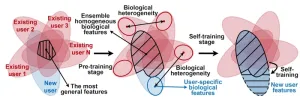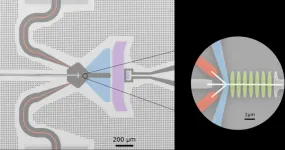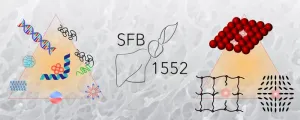(Press-News.org) Surface electromyography (EMG) has been widely used to measure the electrical activity of muscles. However, the variability in EMG sensing signals due to biological differences of different users significantly degrades the performance and potential of EMG systems. Recently, researchers from City University of Hong Kong (CityU) developed a deep learning-based framework called EMGSense, which can achieve high sensing performance for new users using AI self-training techniques. This opens a new path for developing more advanced and accurate wearable EMG devices in areas like neurorehabilitation and virtual reality.
This latest invention won an award at The 21st International Conference on Pervasive Computing and Communications (PerCom 2023) held at Atlanta, USA. It helps overcome the bottleneck in existing approaches and supports the widespread adoption of EMG-based applications.
EMG measures the electrical activity of muscles using surface electrodes on the skin. EMG-based sensing has attracted considerable attention in recent years and has created a lot of intelligent applications, such as neurorehabilitation, activity recognition, gesture recognition and virtual reality. But a fundamental challenge in existing EMG systems is how to tackle cross-user scenarios. EMG signals can be seriously influenced by various biological factors, such as body fat, skin conditions, age and fatigue. So significant performance degradation would be caused by time-varying biological heterogeneity when the EMG system is employed by different users.
To address this challenge, researchers from the Department of Computer Science at CityU recently proposed the first low-effort, AI-empowered domain adaptation framework, called EMGSense, which provides high-accuracy EMG sensing for new users using AI-training techniques. EMGSense is a self-supervised system with a self-training AI strategy. It can cope with the performance degradation caused by inter-user biological heterogeneity.
The new framework integrates advanced self-supervised techniques into a carefully designed deep neural network (DNN) structure. It uses small-scale unlabeled data from a new user and pre-collected data from several existing users to train a discriminative model to realize intelligent applications for new users. The pre-collected data is stored in the cloud and can serve all new users, reducing the burden of data collection and annotation.
EMGSense’s DNN structure involves two training stages, which complement each other. It first eliminates user-specific features in the feature space for easy transferring, and then it employs AI techniques to re-learn new target’s user-specific biological features in that space for high-performance EMG sensing. This allows EMGSense to adapt to new users with satisfactory performance in a low-effort, self-supervised manner without wasting significant deployment overhead.
In addition, the researchers leveraged the unlabeled data collected during the usage to achieve long-term robust performance that can handle the time-varying nature of EMG signals.
A comprehensive evaluation of two sizable datasets collected from 13 participants indicated that EMGSense achieved an average accuracy of 91.9% and 81.2% in gesture recognition and activity recognition, respectively. EMGSense also outperformed state-of-the-art EMG-oriented domain adaptation approaches by 12.5%–17.4% and achieved comparable performance with one trained in a supervised-learning manner.
The novel EMGSense framework has the potential to revolutionize the field of EMG sensing by reducing the burden of data collection and annotation, while achieving high accuracy in a low-effort manner. It fills the research gap in heterogeneity problems in EMG sensing and enables a variety of novel EMG-based cross-user applications, such as clinical practice, neurorehabilitation and human-machine interaction. It also makes a humble step towards the ubiquity of smart EMG wearable devices with higher performance in real-world scenarios.
The paper was published at the PerCom 2023, and it won the “Mark Weiser Best Paper Award”. The paper title is “EMGSense: A Low-Effort Self-Supervised Domain Adaptation Framework for EMG Sensing”.
The first author of the research is Mr Duan Di, a PhD student in the Department of Computer Science at CityU. The corresponding author is Dr Xu Weitao, Assistant Professor in the same department. Other team members from CityU include Professor Jia Xiaohua and Mr Yang Huanqi. The research is supported mainly by the Hong Kong Research Grant Council and General Research Fund.
https://www.cityu.edu.hk/research/stories/2023/05/25/cityu-researchers-develop-self-supervised-ai-adaptation-framework-enhance-sensing-accuracy-emg-devices
END
CityU researchers develop a self-supervised AI adaptation framework to enhance sensing accuracy of EMG devices
2023-05-25
ELSE PRESS RELEASES FROM THIS DATE:
Insilico Medicine receives IND approval for novel AI-designed USP1 inhibitor for cancer
2023-05-25
Insilico Medicine (“Insilico”), a generative artificial intelligence (AI)-driven clinical stage drug discovery company, today announced that the U.S. Food and Drug Administration (FDA) recently approved the initial investigational new drug (IND) application for ISM3091 for the treatment of patients with solid tumors. This is Insilico's first oncology program to advance to the clinical validation stage.
The open-label, multicenter Phase I clinical trial of ISM3091 will be conducted simultaneously in the U.S. and China ...
Quantum scientists accurately measure power levels one trillion times lower than usual
2023-05-25
Scientists in Finland have developed a nanodevice that can measure the absolute power of microwave radiation down to the femtowatt level at ultra-low temperatures – a scale trillion times lower than routinely used in verifiable power measurements. The device has the potential to significantly advance microwave measurements in quantum technology.
Measuring extremely low power
Quantum science takes place mostly at ultra-low temperatures using devices called dilution refrigerators. ...
Enhancing patient care by improving electronic health records: Plan outlines 3 'essential' steps
2023-05-25
An early advocate for the electronic health records now found in hospitals across the country has developed a plan to improve their use, lighten clinicians’ workload and enhance patient care.
The University of Virginia School of Medicine’s Don Detmer, MD, MA, designed the improvement plan in collaboration with Andrew Gettinger, MD, of Dartmouth’s Geisel School of Medicine. Detmer oversaw UVA’s adoption of electronic physician order entry in the early 1990s while vice president ...
Material design by means of defect engineering: German Research Foundation approves new Collaborative Research Center at Mainz University
2023-05-25
When we talk about defects, we generally think of flaws or impairments. However, as far as materials science is concerned, defects represent windows of opportunity. A new Collaborative Research Center (CRC) in the field of soft matter based at and administered by Johannes Gutenberg University Mainz (JGU) will explore these opportunities. The German Research Foundation (DFG) has approved CRC 1552 "Defects and Defect Engineering in Soft Matter" and will be providing funding of some EUR 8 million over the next four years. Also participating are the Max Planck Institute for Polymer Research and the Fraunhofer Institute for Microengineering and Microsystems ...
Scientists propose revolution in complex systems modelling with quantum technologies
2023-05-25
Scientists have made a significant advancement with quantum technologies that could transform complex systems modelling with an accurate and effective approach that requires significantly reduced memory.
Complex systems play a vital role in our daily lives, whether that be predicting traffic patterns, weather forecasts, or understanding financial markets. However, accurately predicting these behaviours and making informed decisions relies on storing and tracking vast information from events in the distant past – a process which presents huge challenges.
Current models using artificial intelligence see their ...
Certain cancers will likely rise exponentially due to COVID-19 screening delays
2023-05-25
Key Takeaways
Current cancer diagnoses compared with pre-pandemic rates: Researchers quantified missed diagnoses of lung, breast, and colorectal cancers by comparing observed cancer rates in 2020 with pre-pandemic cancer rates (2010-2019).
Potential increase in undiagnosed disease: Incidence rates for all three types of cancer have significantly decreased, suggesting that many patients may currently harbor undiagnosed disease.
Importance of screening: Study adds to the growing body of literature on pandemic-related disruptions and serves as a vital reminder to encourage all patients to stay up to date on their recommended cancer screenings.
CHICAGO: ...
UTHealth Houston awarded nearly $13M in grants to study treatments for traumatic brain injury
2023-05-25
Nearly $13 million in federal grant funds to study treatments for traumatic brain injury, which kills an average of 190 people and hospitalizes another 600 in the U.S. every day, has been awarded to UTHealth Houston by the Department of Defense’s Office of Congressionally Directed Medical Research Programs (CDMRP).
The funding marks a positive step forward for patients suffering from the medical condition, said Charles S. Cox Jr., MD, the George and Cynthia Mitchell Distinguished Chair in Neurosciences and the Glassell Family Distinguished Chair in the Department of Pediatric Surgery with McGovern ...
Research team receives grant to launch ‘Just Dis Tech’ project
2023-05-25
A group of Virginia Tech faculty who represent a variety of disciplines is bringing the principles of disability justice to Appalachia through educational workshops, cultural events, and technology research.
The team received a $502,000 grant from the Andrew Mellon Foundation to create local and regional programming for disability-led arts, culture, reflection, and technology guidance. The foundation is a nonprofit organization that funds arts and humanities work nationwide.
With the three-year project, called “Just ...
Weevils, long-nosed beetles, are unsung heroes of pollination
2023-05-25
Butterflies, bees, and even bats are celebrated as pollinators: creatures that travel from flower to flower to feed, and in the process, help fertilize the plants by spreading pollen. But some of nature’s most diverse pollinators often go unnoticed, even by scientists: long-snouted beetles called weevils. A new study in the journal Peer Community in Ecology provides a deep dive into the more than 600 species of weevils, including ones whose entire life cycles are interwoven with a specific plant that they help pollinate.
“Even people who work on pollination don't usually consider weevils as one of the main pollinators, and people who ...
An emergency department visit as part of a continuum of care
2023-05-25
INDIANAPOLIS -- Even before the COVID-19 pandemic, more than 100 million hospital emergency department (ED) visits took place annually in the U.S. In two studies, Regenstrief Institute Research Scientist Sharmistha Dev, M.D., MPH, and colleagues characterize an ED visit as part of a continuum of care, exploring how an ED visit is a valuable arena to support care beyond the issue that motivated the visit.
“Many people view a patient’s ED visit as a moment of acute care and a moment of dealing with just one issue and then the patient is either admitted or discharged. But ...









